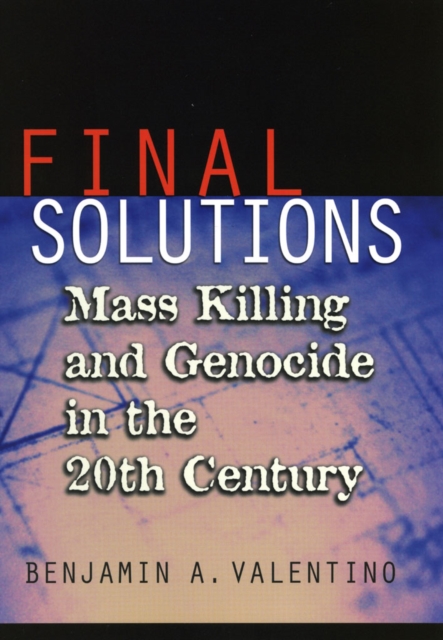Final Solutions: Mass Killing and Genocide in the 20th Century

Final Solutions: Mass Killing and Genocide in the 20th Century
Benjamin A. Valentino finds that ethnic hatreds or discrimination, undemocratic systems of government, and dysfunctions in society play a much smaller role in mass killing and genocide than is commonly assumed. He shows that the impetus for mass killing usually originates from a relatively small group of powerful leaders and is often carried out without the active support of broader society. Mass killing, in his view, is a brutal political or military strategy designed to accomplish leaders' most important objectives, counter threats to their power, and solve their most difficult problems.
In order to capture the full scope of mass killing during the twentieth century, Valentino does not limit his analysis to violence directed against ethnic groups, or to the attempt to destroy victim groups as such, as do most previous studies of genocide. Rather, he defines mass killing broadly as the intentional killing of a massive number of noncombatants, using the criteria of 50,000 or more deaths within five years as a quantitative standard.
Final Solutions focuses on three types of mass killing: communist mass killings like the ones carried out in the Soviet Union, China, and Cambodia; ethnic genocides as in Armenia, Nazi Germany, and Rwanda; and "counter-guerrilla" campaigns including the brutal civil war in Guatemala and the Soviet occupation of Afghanistan. Valentino closes the book by arguing that attempts to prevent mass killing should focus on disarming and removing from power the leaders and small groups responsible for instigating and organizing the killing.
PRP: 185.69 Lei
Acesta este Prețul Recomandat de Producător. Prețul de vânzare al produsului este afișat mai jos.
148.55Lei
148.55Lei
185.69 LeiLivrare in 2-4 saptamani
Descrierea produsului
Benjamin A. Valentino finds that ethnic hatreds or discrimination, undemocratic systems of government, and dysfunctions in society play a much smaller role in mass killing and genocide than is commonly assumed. He shows that the impetus for mass killing usually originates from a relatively small group of powerful leaders and is often carried out without the active support of broader society. Mass killing, in his view, is a brutal political or military strategy designed to accomplish leaders' most important objectives, counter threats to their power, and solve their most difficult problems.
In order to capture the full scope of mass killing during the twentieth century, Valentino does not limit his analysis to violence directed against ethnic groups, or to the attempt to destroy victim groups as such, as do most previous studies of genocide. Rather, he defines mass killing broadly as the intentional killing of a massive number of noncombatants, using the criteria of 50,000 or more deaths within five years as a quantitative standard.
Final Solutions focuses on three types of mass killing: communist mass killings like the ones carried out in the Soviet Union, China, and Cambodia; ethnic genocides as in Armenia, Nazi Germany, and Rwanda; and "counter-guerrilla" campaigns including the brutal civil war in Guatemala and the Soviet occupation of Afghanistan. Valentino closes the book by arguing that attempts to prevent mass killing should focus on disarming and removing from power the leaders and small groups responsible for instigating and organizing the killing.
Detaliile produsului










